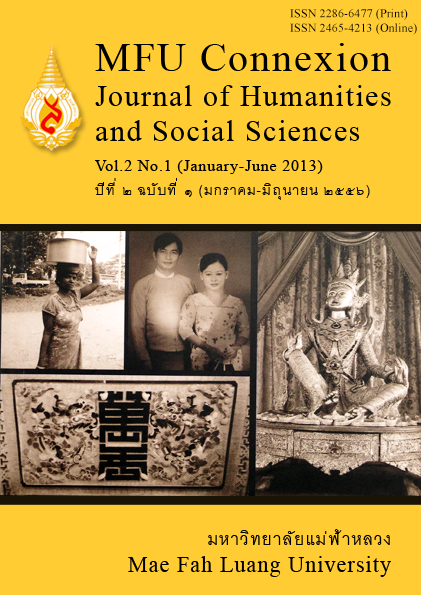การทำนายชีวิตด้วยกระดูกไก่ของกลุ่มชาติพันธุ์ต่าง ๆ ในจังหวัดเชียงราย
Main Article Content
Abstract
This research aims to study chicken bone divination among various ethnic groups, i.e. Lahu, Karen, Yao, Hmong, Yunnanese Chinese, Akha, and Lua (Plang) in Chiang Rai province by comparing the manuscripts concerning chicken bone divination of Lua (Plang) with that of in daily life. The information herein has been obtained through interviews with some authoritative sources, the participation of the ethnic groups, and translation from written manuscripts. The research conducted between 2004 and 2007 showed that chicken bone divination was used in communities entitled “the hunter-gatherer and swidden agriculture”. The complexity was reduced when the communities became “intensive agriculture communities”. Moreover, when the truth through was explained through a religious process, chicken bone divination would be left as a written record. It was also shown that ethnic groups focused on the transformation of the status as well as the physical area. Therefore, the result revealed that “the hunter-gatherer and swidden agriculture” community has generated an overlap between human beings and wild faunas, especially wild fowls; thus human beings were closely related to fowls. The imagination of fowls manifested the inter-relationship among fowls, human beings, and nature. This inter-relationship has been used to explain the truth of unknown situations by members of “the hunter-gatherer and swidden agriculture” community until they have become the intensive agriculture. Instead of nature, they applied religious approaches to explain the truths. Chicken bone divination, therefore, became the recorded myth and belief.
Article Details
Copyright
Connexion: Journal of Humanities and Social Sciences has an exclusive right to publish the accepted articles in any form. However, the author retains the following rights:
1. The right to the ownership of the article;
2. The right to use all or part of the article in his/her other works;
3. The right to re-produce the article for personal use or for use in the author’s organisation, in which case the author must obtain permission from Connexion: Journal of Humanities and Social Sciences;
4. The right to make copies of all or part of the work for educational use or for the author’s use in classroom teaching; and
5. The right to include the work (both the preprinted and printed versions) in an institutional repository.
References
กัลยา ติงศภัทิย์, สุกัญญา สุจฉายา, ชมนาด ศีติสาร, และพลวัฒ ประพัฒน์ทอง.(2549) ความหมายและบทบาทของไก่ในโลกทัศน์ของชาวอาข่าในความสัมพันธ์ระหว่างมนุษย์กับไก่ จากพิธีกรรมและคติความเชื่อในกลุ่มชาติพันธุ์, เชียงราย: โครงการจัดตั้งพิพิธภัณฑ์อารยธรรมลุ่มน้ำโขง.
ค่าวซอธรรมเรื่องเจ้าสุวัตร์, (ม.ป.ป.) กรุงเทพฯ: ประเทืองวิทยา.
ฉวีวรรณ ประจวบเหมาะ, สรินยา คำเมือง, สมรักษ์ ชัยสิงห์กานานนท์, บุญสม ชีรวณิชย์กุล และอธิตา สุนทโรทก. (2555) ปริศนาวงศาคณาญาติ “ลัวะ”, กรุงเทพฯ: ศูนยมานุษยวิทยาสิรินธร.
ทวี สว่างปัญญากร. (2533) พงศาวดารเชียงตุง, ม.ป.ท.
บุญช่วย ศรีสวัสดิ์. (2547) 30 ชาติเชียงราย, กรุงเทพฯ: ศยาม.
พลวัฒ ประพัฒน์ทอง. (2549) ตำราการทำนายด้วยกระดูกไก่ บ้านห้วยน้ำขุ่น อำเภอแม่ฟ้าหลวง จังหวัดเชียงราย. ใน ความสัมพันธ์ระหว่างมนุษย์กับ ไก่จากพิธีกรรมและความเชื่อในกลุ่มชาติพันธุ์จังหวัดเชียงราย (น. 25-59), เชียงราย: โครงการจัดตั้งพิพิธภัณฑ์อารยธรรมลุ่มน้ำโขง มหาวิทยาลัย แม่ฟ้าหลวง.
พลวัฒ ประพัฒน์ทอง. (2550) บทบาทและพิธีกรรมของการทำนาย ที่มีต่อการดำรงชีวิตของกลุ่มชาติพันธุ์ลัวะ ในหมู่บ้านห้วยน้ำขุ่น อำเภอแม่ฟ้าหลวง จังหวัดเชียงราย (รายงานผลการวิจัย), กรุงเทพฯ: สำนักงานคณะกรรมการวัฒนธรรมแห่งชาติ กระทรวงวัฒนธรรม.
พลวัฒ ประพัฒน์ทอง. (2555) ตามรอยไตรภูมิในพุทธศาสนาของกลุ่มชาติพันธุ์ หลอย (ปลัง), รายงานการสำรวจจากเชียงตุง เมืองลาถึงเมืองสามเต้า. (น. 3-44), เชียงราย: โครงการจัดตั้งพิพิธภัณฑ์อารยธรรมลุ่มน้ำโขง มหาวิทยาลัยแม่ฟ้าหลวง.
เรณู วิชาศิลป์. (ม.ป.ป) การทำนายกระดูกไก่ของคนไทบางกลุ่ม, ม.ป.ท.
สุกัญญา สุจฉายา. (2549) ไก่เสี่ยงทายตัวแรกจากตำนานชนชาติไทย: การตีความ ตำนาน, ความสัมพันธ์ระหว่างมนุษย์กับไก่จากพิธีกรรมและคติความเชื่อในกลุ่มชาติพันธุ์, เชียงราย: โครงการจัดตั้งพิพิธภัณฑ์อารยธรรมลุ่มน้ำโขง.
สุวรรณา เกรียงไกรเพชร. (2544) 13 ชนเผ่าในลาวตอนใต้: วิถีชีวิตและวัฒนธรรม, กรุงเทพฯ: สำนักงานกองทุนสนับสนุนการวิจัย.
อะกิฌิโนะมิยะ ฟูมิอิโตะ. (2550) ไก่กับคนจากมุมมองชีวชาติพันธุ์วิทยา (ชมนาด ศีติสาร, ผู้แปล), กรุงเทพฯ: อมรินทร์พริ้นท์ติ้งแอนด์พับลิชชิ่ง.
Terwiel, B. J. (1980) The Tai of Assam and ancient Tai Ritual, vol. 2, Gaya Bihar: Centre for Southeast Asian Studies.


